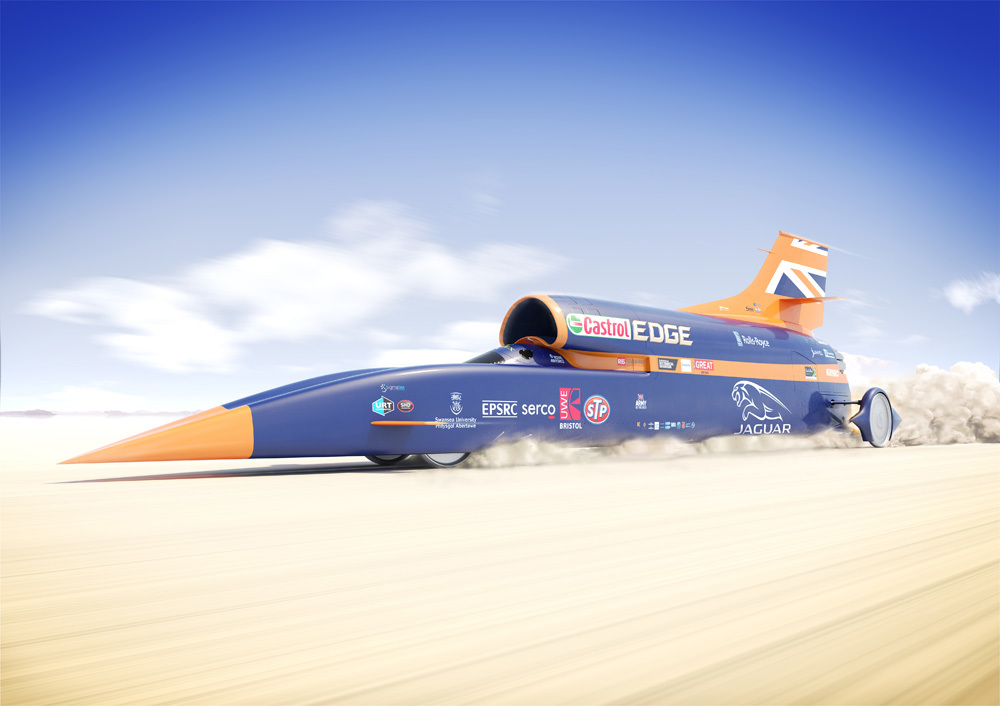
The driving force behind what will be the world’s first 1,000mph car is on a mission to inspire the next generation of engineers.
Richard Noble, the Scottish entrepreneur, is best known as the man who drove the Thrust2 at 633mph and held the land-speed record between 1983 and 1997.
He was also behind the ThrustSSC supersonic car, driven by Andy Green, which holds the record at 763mph, faster than the speed of sound.
Noble was in north east Scotland to visited Paradigm Flow Solutions, based near Aberdeen, to deliver a motivational speech to inspire school students to become young engineers of the future and to dispel the perception that modern teenagers are more interested in “poetry and pastry”, rather than science and technology.
He met pupils from Banchory Academy to tell them about his latest land speed record attempt next year, when his £50million Bloodhound SSC project aims to pass the 1,000mph mark.
“Britain hasa really serious problem with a shortage of engineers and IT staff.
“Britain is £1.3trillion in debt. The bankers are never going to get us out of it, the only we can do it is through manufacturing. But we can’t get the investment and we can’t get the engineers.
“Bloodhound is being used as an inspiration device to get the kids to think in terms of engineering and science careers.”
Noble’s contribution to changing hearts and minds is Bloodhound. The car will make the record-breaking bid at Hakskeen Pan, South Africa currently scheduled for 2017. The product of eight years of research, design and manufacturing, involving over 350 companies and universities.
He said: “The country is desperately out of balance, we need the kids to consider engineering and scientific careers. The media is concentrating on the lighter sides of life – it’s all theatre, arts, poetry and pastry.
“There’s no engineering. There’s this bias in the media that’s affecting the kids because they are not considering engineering careers.”
“Bloodhound is in the business of inspiration, rather than education. There are 6,000 schools following it.”
Noble’s lifetime obsession with speed has led him to build the ultimate car.
“It’s a very, very difficult thing to do. Back in 2007, Lord Drayson, then MOD minister for Defence Equipment and Supply told us that if we wanted Ministry of Defence support, we had to engage the schools, which we did. It has been a huge success and the kids are now building rocket cars. The colleges are coming in, but the key to the whole thing was a group of teachers and they were very depressed by lack of interest of kids in science, technology, engineering and maths.
“They told us they wanted all the data from our car live on the web as it happens. It took us too long to realise that was our unique selling proposition of the entire project. The defence industry can’t, the space industry won’t and Formula 1 is engaged in competition which means the don’t share their data, but we could.
“We will export 5,000 data channels next year every time the car runs, so that the kids can interrogate that data and understand how the car works. It’s going to be absolutely fascinating.”
Paradigm Flow Services managing director Rob Bain said: “We absolutely get what Richard has done in his career in terms of pushing the boundaries of technologies and taking on really difficult challenges, dealing with all the issues going into new markets, often with limited resources and really striving to deliver something that is really different and unique and making that compelling case.
“That’s why we exist as a business. We believe that even with all the challenges in the oil and gas industry, there will always be a demand for high-technology expertise globally.”
Noble agrees.
He added: “We still lead the world in terms of technology. Britain comes up with all these brilliant ideas such as the fax machine, LED lighting, graphene but the money is made elsewhere. It’s just stupid. We need a very big cultural change in this country.”
“We have this very hostile culture. It has become very difficult to do anything new in Britain, it’s very serious difficulty. Bloodhound has got really powerful social values about winding kids up and getting them passionate about engineering.”
“We’ve try to inspire more than 100,000 kids every year. What is extraordinary is that once we start giving the information and understanding the questions that come back are extraordinary.”